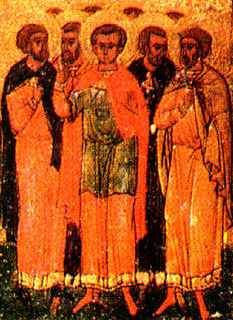Saint Agapius of Palestine (Greek Άγιος Αγάπιος, from the Gr. αγάπη, love) was a Christian martyr from Gaza, beheaded along with seven others by order of Urban, governor of Palestine, in the year 303 or 304 under the Great Persecution of Diocletian. Eusebius records that Timolaus of Pontus, Dionysius from Tripolis in Phœnicia, Romulus, said to have been sub-deacon of the parish of Diospolis, Plæsius of Egypt, and two men named Alexander, one from Gaza and the other from Gazahad. These six young men bound themselves and surrendered to Urban in the hopes of becoming martyrs. They openly professed their Christianity and said that their faith made them unafraid of the wild animals of the arena. Urban had them put into prison. A few days later they were joined by two others, one a certain Dionysius, and the other Agapius, who is said to have been tortured in the past for his faith. All eight were beheaded in Caesarea Maritima on the same day.
Christian usually refers to:

A martyr is someone who suffers persecution and death for advocating, renouncing, refusing to renounce, or refusing to advocate a belief or cause as demanded by an external party. This refusal to comply with the presented demands results in the punishment or execution of the martyr by the oppressor. Originally applied only to those who suffered for their religious beliefs, the term has come to be used in connection with people killed for a political cause.

Diocletian, born Diocles, was a Roman emperor from 284 to 305. Born to a family of low status in Dalmatia, Diocletian rose through the ranks of the military to become Roman cavalry commander to the Emperor Carus. After the deaths of Carus and his son Numerian on campaign in Persia, Diocletian was proclaimed emperor. The title was also claimed by Carus' surviving son, Carinus, but Diocletian defeated him in the Battle of the Margus.
His feast day is observed on March 24. The Greek Orthodox Church observes his memory on March 15. [1]




